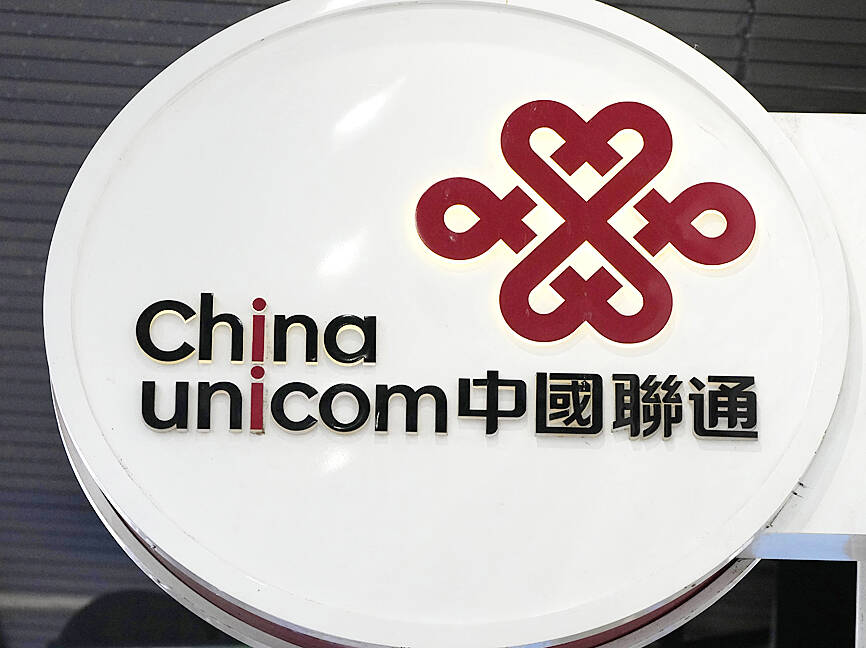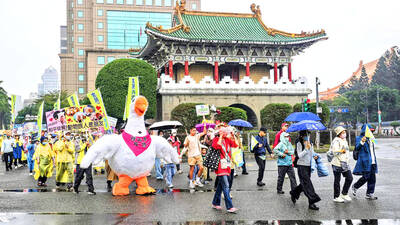Starting from this month, Taiwan’s telecoms must not allow data roaming for China Unicom Hong Kong’s prepaid card users if the SIM cards they use are not registered under real names, the National Communications Commission said yesterday.
Taiwan’s telecoms are required to follow the real-name system by asking telecom services applicants to present two photo IDs, the commission said.
However, some overseas telecoms sell prepaid cards to people traveling to Taiwan and do not require users to register SIM cards using their real names, it said.

Photo: AP
Such unregistered prepaid cards are also called “BlackBerry” cards and could be exploited by scammers, it said.
Criminal Investigation Bureau data showed that a majority of scammers use China Unicom Hong Kong’s prepaid cards, the commission said.
“We are asking Taiwan’s telecoms to not offer data roaming services for China Unicom Hong Kong’s prepaid card users if their real names are not registered on SIM cards. Telecoms began implementing the policy on Wednesday last week,” it said.
Scammers prefer to use telecom services in Hong Kong, Macau and Southeast Asian nations, as they are home to many Taiwanese businesspeople, it said.
Stopping data roaming services would prevent scammers from engaging in money laundering through Web banks and increase the cost of committing fraud, the commission said.
Scammers using Wi-Fi would make it even easier for the police to trace their online activities, the commission said.
China Unicom Hong Kong’s users can still use prepaid cards to make calls and send text messages, while data roaming services would be reactivated if their names are registered on the SIM cards, the commission said.
All five major telecoms in Taiwan have signed international roaming agreements with their counterparts in other countries, and the agreements allow two-way roaming services to be suspended if criminal activity is suspected, the commission said.
“In addition to Hong Kong, we are asking telecoms to consider re-examining their roaming agreements within countries in Southeast Asia. The goal is to block the data transmitted through unregistered SIM cards,” it said.

NUMBERS IMBALANCE: More than 4 million Taiwanese have visited China this year, while only about half a million Chinese have visited here Beijing has yet to respond to Taiwan’s requests for negotiation over matters related to the recovery of cross-strait tourism, the Tourism Administration said yesterday. Taiwan’s tourism authority issued the statement after Chinese-language daily the China Times reported yesterday that the government’s policy of banning group tours to China does not stop Taiwanese from visiting the country. As of October, more than 4.2 million had traveled to China this year, exceeding last year. Beijing estimated the number of Taiwanese tourists in China could reach 4.5 million this year. By contrast, only 500,000 Chinese tourists are expected in Taiwan, the report said. The report

Temperatures are forecast to drop steadily as a continental cold air mass moves across Taiwan, with some areas also likely to see heavy rainfall, the Central Weather Administration (CWA) said. From today through early tomorrow, a cold air mass would keep temperatures low across central and northern Taiwan, and the eastern half of Taiwan proper, with isolated brief showers forecast along Keelung’s north coast, Taipei and New Taipei City’s mountainous areas and eastern Taiwan, it said. Lows of 11°C to 15°C are forecast in central and northern Taiwan, Yilan County, and the outlying Kinmen and Lienchiang (Matsu) counties, and 14°C to 17°C

STEERING FAILURE: The first boat of its class is experiencing teething issues as it readies for acceptance by the navy, according to a recent story about rudder failure The Hai Kun (海鯤), the nation’s first locally built submarine, allegedly suffered a total failure of stern hydraulic systems during the second round of sea acceptance trials on June 26, and sailors were forced to manually operate the X-rudder to turn the submarine and return to port, news Web site Mirror Daily reported yesterday. The report said that tugboats following the Hai Kun assisted the submarine in avoiding collisions with other ships due to the X-rudder malfunctioning. At the time of the report, the submarine had completed its trials and was scheduled to begin diving and surfacing tests in shallow areas. The X-rudder,

DEMAND: The government should enact regulations in line with Austria and Germany to incorporate vegan nutrition into school meals, an advocate said More than 1,000 people yesterday marched in Taipei to promote veganism, calling for legislation to incorporate vegan diets into school lunches and the national net zero emissions program. Participants gathered on Ketagalan Boulevard in front of the Presidential Office Building for the march, which was organized by the Vegan Action Network (VAN). Former ambassador to Chad Chiu Chung-jen (邱仲仁), actor Yankee Yang (楊子儀) and actress Cindy Lien (連俞涵) attended the event. VAN member Marianne Chao (趙梅君) said that the campaign aimed to urge the government to promote vegan diets across schools and government agencies via legislation and national policies, which would help build